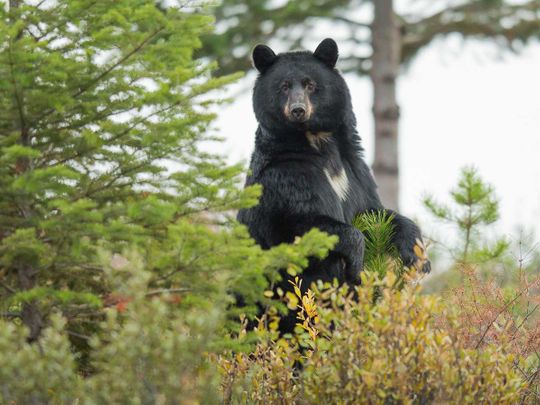
Here’s a true story that tells us something about humans and how we interact with wildlife. Three male friends (in India) — Akhil, Siva and Kanna — mid-thirties, find themselves at a loose end one weekend. Their wives (and children) have gone on a two-day excursion. The men decide to do something to fill in the hours. They agree upon a drive through the tiger reserve, four hours away. ‘Might get lucky and see a tiger,’ says Kanna. ‘In that case bring your Nikon,’ Siva tells Kanna, adding, ‘Mobile phones are not as sharp for distant shots.’ So, suitably equipped, they set off. ‘You may be in for good day,’ the forest ranger at the entrance gate tells them, ‘Yesterday a lot of visitors who drove through saw different animals.’
Apparently, spotted deer were out in significant numbers, so were wild boar. Three wild elephants were also sighted — two adults and a baby — crossing the road. ‘Any tigers?’ inquire the men excitedly. ‘No, but today may be your day,’ says the ranger. ‘If deer are around, a hungry tiger can’t be far behind,’ forecasts Akhil. Equipped with a truck load of enthusiasm they commence their slow drive into the reserve, peering closely into the thick bushes off the roadside and further into the forestry behind the bushes — tall trees. Kanna is armed with the camera, waiting. Siva is desperate to get out of the car and light a cigarette. ‘You must not get out of your vehicle,’ the ranger at the gate has warned. Akhil reminds Siva of this. ‘It’ll be extreme coincidence if a tiger happens to be lurking exactly at the spot where I stop to have a smoke,’ rationalises Siva. All the same, he is voted down.
Eventually, they see a couple of pheasants crossing the road. For the rest of the drive up and down the reserve they see nothing. The trip has been a disaster. ‘Animals somehow sense when we want to see them,’ says Akhil, ‘so they stay hidden and watch us instead.’ The men are dismayed but reluctant to go home. ‘Let’s return tomorrow,’ suggests Kanna. The four-hour drive back is simply too long for a next-day return the others argue. ‘So let’s book into a lodge nearby,’ suggests Siva. Good idea, they all agree.
The wayside motel is not too distant from the reserve and, as luck would have it, not over booked at all. After a welcome dinner and a quick peek at the pictures of the pheasants, they settle down to a game of cards accompanied by a few beverages to pass the time before bed. Around midnight, a bit light-headed from drinking, they decide it’s time to turn in for the night. ‘Early start tomorrow,’ Kanna reminds them. ‘I’ll step out for one last cigarette,’ says Siva. He unbolts the door, pulls it wide open then slams it shut immediately and rams the bolt home.
When he turns his features are a shade of grey. ‘What is it?’ asks Akhil. ‘Ghost?’ suggests Kanna. ‘Bear,’ says Siva almost inaudibly. ‘Bear? Joker!’ says Kanna. He moves to go check for himself but Siva blocks his way. ‘It’s a real bear, man! You cannot open the door.’ ‘Didn’t we come to see wildlife?’ Kanna inquires. ‘Yes, but not up this close,’ Siva declares. In the end, they manage to turn on the porch light and, through the narrow window, get a picture of the bear lumbering away from their door. The next morning local residents tell them bear sightings are becoming increasingly common as these animals extend their area foraging for food that’s becoming harder to get in the shrinking forest. The three men, however, suitably shaken by the previous night, decide to abandon another drive through the reserve.
Kevin Martin is a journalist based in Sydney, Australia.









